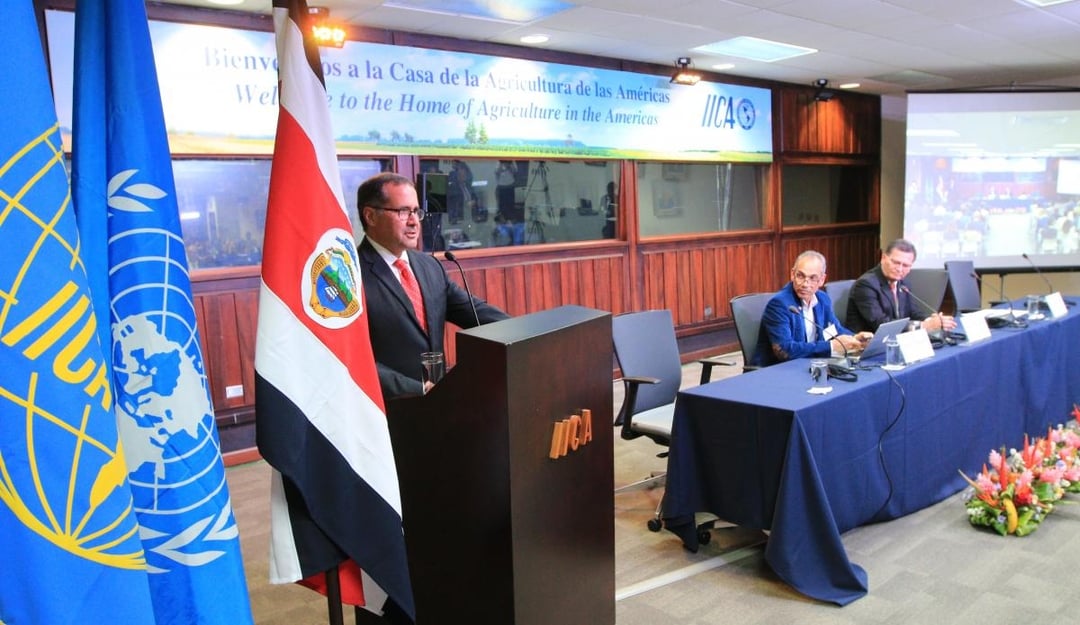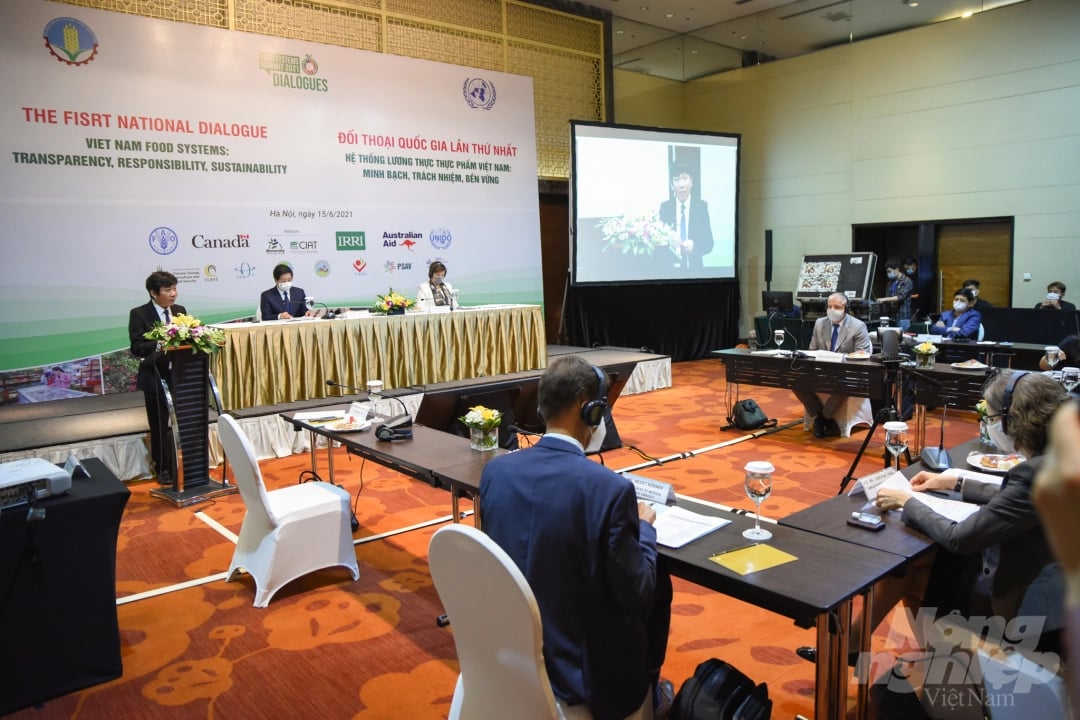May 30, 2025 | 20:37 GMT +7
May 30, 2025 | 20:37 GMT +7
Hotline: 0913.378.918
May 30, 2025 | 20:37 GMT +7
Hotline: 0913.378.918

The 2nd Global Conference on Sustainable Food Systems was held in Costa Rica in 2019. Photo: IICA.
Up to now, according to the Department of International Cooperation, besides leaders of the Ministry of Agriculture and Rural Development of the host country Vietnam, nine ministers, deputy ministers, and heads of sectors from countries such as Switzerland, Cuba, and Cambodia... has registered to participate the 4th Global Conference of the Sustainable Food Systems Program (“the Conference”).
The Organizing Committee also accepted registrations and sent invitations to the event in Hanoi, from April 24 to 28, to more than 200 delegates.
Some Vietnam's delegates were invited to the upcoming Conference, including Mr. Dao The Anh, Deputy Director of the Vietnam Academy of Agricultural Sciences; Mr. Tran Cong Thang, Director of the Institute of Policy and Strategy for Agriculture and Rural Development; Mrs. Tu Thi Tuyet Nhung, Head of the Organic Agriculture Standards Coordination Committee (PGS Vietnam), Vietnam Organic Agriculture Association; Mrs. Nguyen Thi Lan Huong, Chairman of the Board of Directors of Viet Phuc Import-Export and Production Joint Stock Company...
The Sustainable Food Systems (SFS) Programme is a multi-actor partnership focused on catalyzing urgent transformation towards sustainable food systems as a critical strategy to achieve the Sustainable Development Goals (“SDGs”).
So far, three global conferences have been held. The 1st Global Conference on Sustainable Food Systems was held in June 2017 in South Africa. The 2nd Conference was held in February 2019 in Costa Rica. The 3rd Conference was held online in November - December 2020.
The 4th global Conference of the Sustainable Food Systems Programme will contribute to the 2023 Stocktaking Moment of the UN Food Systems Summit follow-up process by focusing on how food systems need to be transformed to overcome the multiple deeply rooted and interlinked crises of climate, biodiversity, conflict, energy, prices, hunger, malnutrition, and health to achieve the SDGs.
The 4th Conference will examine the main barriers, constraints, and challenges associated with transforming the food and food system, discuss solutions, and make actionable recommendations, focusing on four problem groups. First is the model, the global architecture of the food system. Second is the national and local policies and governance. Third is consumption and production patterns. Fourth is the implementation methods.

The first National Dialogue on Vietnam Food System was held on June 15, 2021. Photo: Tung Dinh.
In addition, the Conference will introduce good models, good examples of initiatives related to implementing the national plan to transform food systems at the national and local levels, and the United Nations Food Systems Summit's ("UNFSS") initiatives.
At UNFSS 2021, United Nations Secretary-General Antonio Guterres called on world leaders and national leaders to transform agriculture and sustainable food systems to harmoniously address world challenges with food security, nutrition security, climate change, environmental protection, and biodiversity.
Transforming the food system is central to achieving all SDGs, especially for the poor and vulnerable.
Food security is getting significant attention and discussion at bilateral and multilateral forums due to political instability, food security crisis, and supply chain disruption due to the Russia-Ukraine conflict and the impact of climate change, epidemics, etc.
Many experts say that this is a good time for Vietnam to promote its strengths in the production and export of agro-forestry-fishery products in the regional and global supply chains while contributing to promoting Vietnam's agriculture achievements, promoting agricultural diplomacy, promoting international cooperation on food security and nutrition, green, low-emission agriculture associated with sustainable development.
Countries, United Nations organizations, and international organizations around the globe have seen Vietnam's efforts in coordinating the implementation of sustainable development goals, especially in transforming the food system towards transparency, accountability, and sustainability.
Vietnam gradually becomes an active member, effectively contributing to food security in the region and the world through mobilizing the participation of all actors, based on a global approach, and the support of the international community.
As the host country of the 4th Conference, Vietnam will have the opportunity to share with other countries, United Nations organizations, and international organizations about the efforts, results, and transformation of Vietnam's food system.
The Conference is expected to significantly contribute to the follow-up process of the United Nations Food System Summit, with the first review and assessment conducted in the third quarter of 2023.
The opening session is scheduled to be held on the morning of April 24, followed by thematic sessions. The SFS Program's closing meeting and the Multi-Stakeholder Advisory Committee (MAC) are scheduled to be held on the afternoon of April 27 and the morning of April 28.
Translated by Ha Phuc

(VAN) Vaccinating juvenile pangasius helps reduce disease, antibiotic use, and farming costs, increasing profits for export-oriented farmers in An Giang.

(VAN) Due to a limited supply of workforce and competitive recruitment requirements, businesses struggle to retain talented veterinary human resources.

(VAN) WOAH’s guidance aims to mitigate disease risks through a One Health approach that balances economic, conservation, and public health interests.

(VAN) Ms. Nguyen Thi Dung, Deputy Director of Ngoc Hoang Cooperative, shared about the journey of bringing dragon fruit to Europe, achieving annual revenues in the billions of VND.

(VAN) Bamboo products from Thang Tho Bamboo Cooperative have reached many countries around the world, while also creating jobs for local workers.

(VAN) The Management Board of Con Dao National Park reported that a green sea turtle, tagged in the Philippines, has traveled thousands of kilometers to lay 84 eggs on Bay Canh Islet.

(VAN) Green technology is paving a new path for sustainable aquaculture in the Mekong Delta in particular and across the country in general, helping reduce emissions and adapt to climate change.